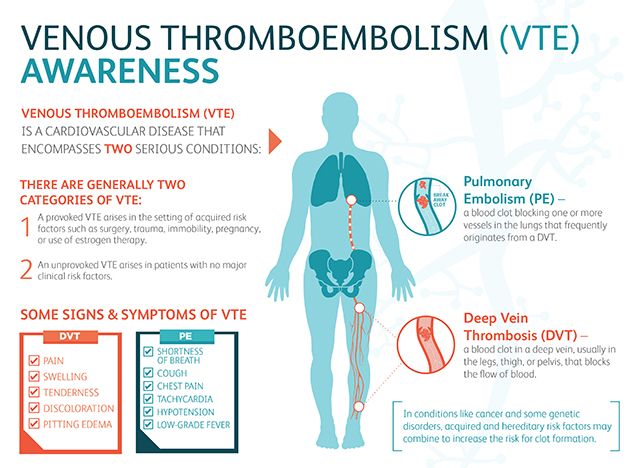Virus News: Austrian Study Shows Of Risk Of Venous Thromboembolism In Hospitalized Patients With COVID‐19
Source: Virus News Oct 02, 2020 4 years, 6 months, 3 weeks, 3 days, 17 hours, 59 minutes ago
Virus News: A new study by researchers from the Medical University of Vienna highlights the risk of hospitalized COVID-19 patients developing venous thromboembolism or VTE.
.jpg)
The study findings were published in the journal: Research and Practice In Thrombosis and Haemostasis.
https://onlinelibrary.wiley.com/doi/10.1002/rth2.12439
The study which for the first time, provide an in-depth analysis on the risk of VTE in patients hospitalized for COVID-19 was led by Dr Cihan Ay, Dr Stephan Nopp, and Dr Florian Moik from the Department of Medicine I, Clinical Division of Haematology and Haemostaseology, Medical University of Vienna-Austria.
Although typically hospitalized patients at general wards have a VTE risk between 5 and 11%, the risk of developing deep vein thrombosis or pulmonary embolism in critically ill patients is 18 to 28%.
Since the beginning of the COVID-19 pandemic, research studies reported an increased rate of thrombosis and pulmonary embolism in patients with COVID-19.
However on the basis of these reports, but without robust evidence from controlled interventional studies, global treatment strategies were developed, recommending more intense thromboprophylaxis strategies.
Dr Cihan Ay, principal Investigator told Thailand Medical News, “This new study now offers a better understanding of the underlying risk and, therefore, aids in individual treatment decisions based on accurate risk assessment for the different patient groups."
The stud team had assessed a total of 5,951 studies published in the field of VTE in COVID-19. Of those, 86 studies were found eligible for inclusion and reported rates of thrombosis and pulmonary embolism in COVID-19 patients.
Upon excluding additional studies due to underlying risk of bias in a structured assessment, 66 studies (28,173 patients) were found eligible to perform a meta-analysis to provide a robust estimate on risk of VTE in COVID-19.
The key study findings are as follows:
-the overall VTE risk in hospitalized patients with COVID-19 is 14%, despite rigorous thromboprophylaxis regimens in most studies.
- in addition, high heterogeneity in VTE rates was found between different patient subgroups.
-the rate was highest in patients admitted to intensive care units, with 23% of patients suffering VTE.
-patients admitted to general wards suffered VTE in 8% of the cases. These findings underline the high risk of VTE in COVID-19 patients.
Furthermore the study team specifically focused on estimating the risk of potentially life-threatening pulmonary embolism.
The study showed that "
The risk of potentially life-threatening pulmonary embolism is considerably higher than in other comparable serious medical illnesses and ranges between 10 and 18% in COVID-19 patients requiring intensive care.”
/>
Alarmingly, deep vein thrombosis was detected in almost half of the hospitalized COVID-19 patients who had been systematically screened for thrombosis using ultrasound.
The study findings underscore the strong impact of COVID-19 on the blood-clotting system.
In addition, an exploratory analysis revealed that patients who developed deep vein thrombosis or pulmonary embolism during hospitalization had significantly higher D-dimer concentrations at admission, a laboratory parameter that indicates an activated coagulation system.
The detailed study finding might be used to help develop personalized, risk-stratified thromboprophylaxis strategies in the future.

More studies are also needed to determine whether elevated D-dimer at hospital admission justifies intensification of anticoagulant treatment in hospitalized patients with COVID-19.
In summary, VTE occurs in 22.7% (23%) of patients with COVID‐19 in the ICU, but VTE risk is also increased in non‐ICU hospitalized patients. Patients developing VTE had higher D‐dimer levels. Studies evaluating thromboprophylaxis strategies in patients with COVID‐19 are needed to improve prevention of VTE.
For more Virus News, keep on logging to Thailand Medical News.
.jpg)
